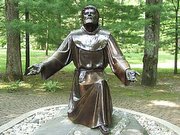God or King?
The mighty gates of Lambeth Palace swung open this morning as I passed by, enabling a glimpse of the courtyard within. It was not difficult to imagine the court of Henry VIII staying there when his ‘old’ palace at Westminster burned down in 1512. Neither was it hard to imagine the cavalcade passing through those same gates when the later Cardinal Wolsey was consecrated Bishop of Lincoln on 26th March 1514, Cardinal Archbishop of York on 10th September 1515 and then, on 24th December, Lord Chancellor of England.
The River Thames has continued to flow past the palace, today as then. It is easy to imagine Thomas More, summoned by Wolsey to discuss ‘the King’s business’ arriving in a boat paddled by one of the many who plied a sort-of water-borne taxi service up and down the river.
How did Wolsey feel as Thomas came up to those same gates? Did he half hope that his future successor would, somehow, have changed his mind and decided to support Henry’s wish to divorce his wife, Catherine of Aragon in favour of Anne Boleyn? Did he think that, somehow, his persuasive tongue had inspired in Thomas a desire to save his own skin and a great deal of inconvenience by throwing in his lot with those who had already opted to follow Henry? Did Wolsey think that, if the incorruptible Thomas were to change sides that the Cardinal’s own conscience would feel more at ease over the divorce proceedings and the subsequent petition to Rome to allow Catherine to be set aside in favour of Anne? Was Wolsey clutching at straws?
...and what of Thomas? Was he afraid as he walked through those gates of Lambeth Palace? He must have suspected why he had been summoned, yet again, and, even as his boat moved from its Chelsea mooring, was he rehearsing his arguments to be placed before Wolsey? How did he feel as one man against the authority and might of his king and a Cardinal? Did he already visualise his imprisonment in a bitterly cold, unheated cell in the Tower of London? Was he already preparing to say goodbye to the family he loved so dearly in order to remain true to his conscience? As the boat crunched on the stony shore outside the palace, did it make a strange, uncomfortable echo in his own heart?
At the end of his life, as he faced his death, Thomas More could write to his daughter Margaret, with absolute truth, "Mistrust him, Meg, will I not, though I feel me faint, yea, and though I should feel my fear even at point to overthrow me too, yet shall I remember how Saint Peter, with a blast of wind, began to sink for his faint faith, and shall do as he did, call upon Christ and pray him to help. And then I trust he shall set his holy hand unto me, and in the stormy seas, hold me up from drowning. Yea and if he suffer me to play Saint Peter further, and to fall full to the ground, and swear and forswear too (which our Lord for his tender passion keep me from, and let me lose if it so fall and never win thereby): yet after shall I trust that his goodness will cast upon me his tender piteous eye, as he did upon Saint Peter, and make me stand up again and confess the truth of my conscience afresh, and abide the shame and the harm here of mine own fault.”
By contrast, Wolsey, on his own deathbed, declared “Would that I had served my God as well as I have served my King!”
Where do I stand?
God bless,
Sr. Janet


